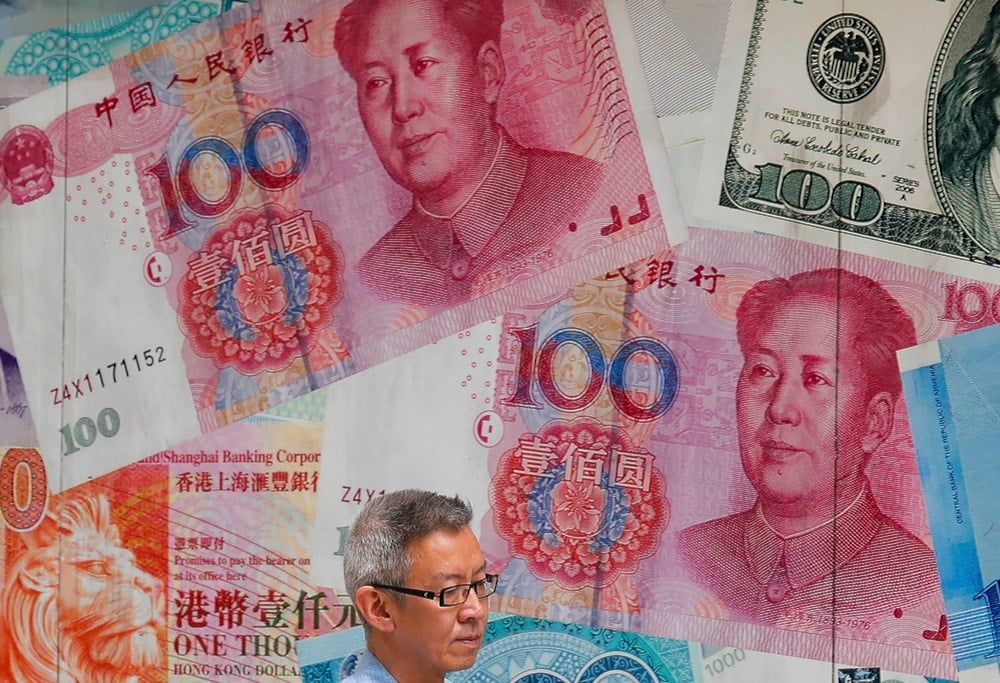China advances yuan in Africa to challenge US dollar
China is strengthening financial partnerships with African countries as part of a strategic push to internationalise the yuan and reduce dependence on the US dollar in trade and investment.
-

A man walks by a money exchange shop decorated with Chinese yuan banknotes and other countries' currency banknotes at Central, a business district in Hong Kong, China, on August 6, 2019. (AP)
During Chinese Premier Li Qiang’s recent visit to Cairo, the People’s Bank of China and Egypt’s central bank signed several agreements aimed at expanding yuan usage in bilateral transactions, the South China Morning Post (SCMP) reported.
These include exploring currency swap arrangements, cooperation on electronic payments, and issuing yuan-denominated “panda bonds” by overseas companies in China’s domestic markets. A key feature of these agreements is the promotion of China’s Cross-border Interbank Payment System (CIPS), an alternative to the US-dominated SWIFT financial network. This will enable banks operating in the China-Egypt TEDA Suez Economic and Trade Cooperation Zone to conduct cross-border transactions directly in yuan, bypassing the US dollar.
Expansion of Yuan use across Africa
Egypt joins other African countries such as Nigeria, South Africa, and Angola that have signed similar yuan-based trade and finance deals with China. Nigeria renewed its 15-billion-yuan (US$2 billion) currency swap with China in December. South Africa’s currency swap with Beijing dates back to 2015 and was recently supplemented by a 2.1 billion yuan loan agreement with the China Development Bank.
China’s growing presence in Africa aligns with its broader goal of testing the yuan’s internationalisation in regions where its trade influence is significant. According to the African Export-Import Bank (Afreximbank), China now accounts for 20% of Africa’s global trade—up from 5% two decades ago. Afreximbank recently joined CIPS to facilitate faster and more autonomous yuan transactions within China-Africa trade.
Read more: Unprecedented decline in Euro usage signals shift to USD, Yuan
Challenges and strategic considerations
Experts see Africa as a suitable testing ground for the gradual internationalization of the yuan. Lauren Johnston, senior research fellow at the AustChina Institute, explained that although China is a major global trader, its currency remains limited in global reach due to capital controls and other policy constraints.
“Any change related to internationalising the RMB will be incremental,” Johnston said, citing complex factors such as exchange rates, growth rates, and capital account policies.
The effort to promote yuan usage comes amid rising geoeconomic tensions over the US-led financial system. The freezing of Russia’s foreign currency reserves after its invasion of Ukraine highlighted vulnerabilities for countries dependent on US or EU-controlled financial networks. This has increased interest among BRICS nations, including Egypt and South Africa, in developing alternatives outside Western jurisdiction.
Read more: Taliban discuss with Russia, China transactions via local currencies
Africa’s growing role in China’s yuan strategy
South Africa’s Standard Bank, Africa’s largest bank and partly owned by China’s Industrial and Commercial Bank (ICBC), has adopted CIPS to facilitate direct yuan interbank payments. Analysts suggest that such initiatives may accelerate a broader shift in China-Africa financial relations.
Aly-Khan Satchu, a sub-Saharan Africa geoeconomic analyst, noted that yuan transactions currently represent a small share of China-Africa trade but have the potential to expand significantly. “This potentially could go to 100 per cent of the trade number,” he said, emphasizing that the trend is moving steadily toward greater yuan adoption, even if displacing the US dollar remains a longer-term challenge.
Read more: US Treasury chief rejects yuan as reserve currency

 3 Min Read
3 Min Read








